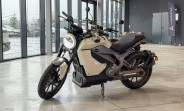HVS introduces hydrogen-powered truck with 500 km range
Hydrogen Vehicle Systems (HVS) is based in Glasgow, Scotland, and the company has just unveiled what it claims is a future of hydrogen-powered long-haul transport. The vehicle has been designed in-house and it offers industry leading solutions when it comes to aerodynamics, powertrain and ergonomics.
HVS is a fairly young company, founded only in 2017 in Glasgow, its main focus is design and development of hydrogen-powered commercial vehicles. The team behind the first vehicle is made up of industry specialists with experience in automotive engineering and design, hydrogen technology, power electronics, sustainability and environment management.

What’s interesting about the new truck - apart from its innovative drivetrain - is the fact that it comes with a defined route to market. The company went to lengths to secure partnerships with strategic suppliers and one of them is EG Group specializing in hydrogen refueling infrastructure. When the truck eventually becomes operational, the fueling stations and fleet customer bases will be ready.
The tractor unit presented by HVS is built on a brand new chassis designed around the in-house developed hydrogen powertrain. The system driving the truck is made up of pressurized hydrogen tanks, fuel cells, batteries and eAxle - a rear axle with built-in electric motor.
Having the freedom of designing a truck from scratch without any constraints from internal combustion engine and all of the ancillary equipment that comes with it, meant the design team was given a chance to create an aerodynamically friendly vehicle. It’s a tall order when it comes to trucks.

The results are rather interesting, the cab has much easier access, there is more room inside and ergonomics are vastly improved. The efficiency of the truck is hugely improved as well and the truck itself looks quite good.
The powertrain uses pressurized hydrogen to power the fuel cells which in turn produce electricity which is stored in batteries in order to power the rear axle. There is an F1 connection here as well - the truck uses KERS to recover energy while it's braking or slowing down - technology first introduced in F1 back in 2009.
According to the company, the hydrogen fuel cells allow the truck longer range and higher load capacity and faster refueling than a comparable electric truck powered by lithium-ion batteries. It means lower running costs as well but when compared to diesel powered trucks, the costs apparently are similar.
HVS argues that refueling times and range are far more important for haulage companies and it makes sense in an environment where every minute counts. But the battery powered trucks are cheaper than diesel or hydrogen to run and if the companies can make more money or waste less money - it’s going to be a tough race.

Hydrogen may feel more “natural” - refueling a car or a truck is similar, it takes almost the same time. In many cases the refueling infrastructure is easier to install than the DC charging stations - especially for heavy duty vehicles.
HVS hopes it has all the answers for the haulage industry, emission restrictions are coming, bans on fossil fuel powered vehicles are already in place and the industry needs to shift and needs to do it quickly. Zero-emissions vehicles that don’t need huge adjustments for the fleet managers and drivers alike will win this race.





Facebook
Twitter
Instagram
RSS
Settings
Log in I forgot my password Sign up